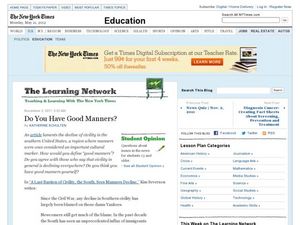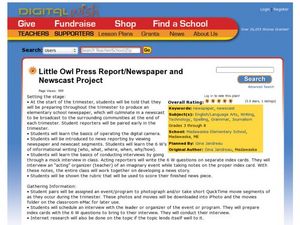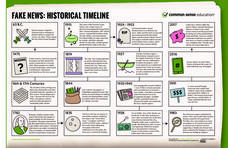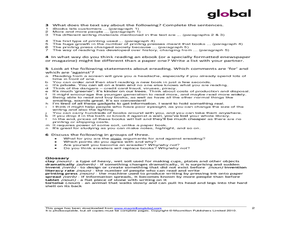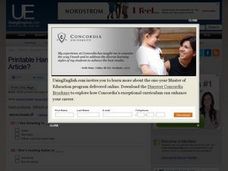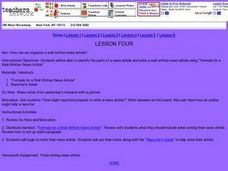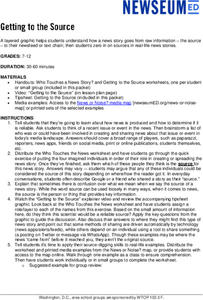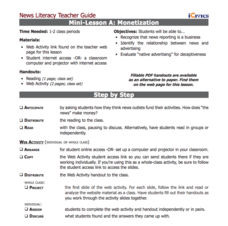Curated OER
Do You Have Good Manners?
Who cares about manners anyway? According to the New York Times, Mrs. Mason does. Learners read and consider an article which addresses the decline of manners and the impact it has on society. They answer seven critical thinking...
American Press Institute
Newspapers in Your Life: What’s News Where?
Big news isn't necessarily newsworthy everywhere! How do journalists decide what to cover with so much happening around them? A instructional activity on media literacy examines the factors that affect the media's choice of stories to...
Curated OER
Little Owl Press Report/Newspaper and Newscast Project
Discover journalistic techniques by having learners prepare and write their own class newspaper. They discuss the five W's of investigative journalism and conduct interviews with school figures. They utilize video technology, podcast...
Common Sense Media
Fake News: Historical Timeline
In 1874, The New York Herald falsely claimed that several animals escaped from the Central Park Zoo, and panic ensued. Using the helpful infographic, pupils discover more instances of fake news throughout history, from as far back as 63...
Curated OER
The Pledge of News
Students explore the fundamentals of news-gathering, the etiquette of reporting, and the rights a news writer/reporter has. They review the parts of a news story and write an article discussing their beliefs about the Pledge iof Allegiance.
Curated OER
Student News And Weather Channel
Fabulous! Your 5th graders should love this project. As an ongoing lesson throughout the year students use temperature probes to record outside temperature and then document their data using spreadsheets. They use their weather data and...
Newseum
Media Ethics: Fairness Formula Starts With Accuracy
As part of a study of media ethics, young journalists apply a fairness formula to news reports. They look at accuracy, balance, completeness, detachment, and ethics to determine if the reporting is fair.
Curated OER
Global News: The Changing Face of Reading
A current and engaging informational text with some superb scaffolding activities, this six paragraph article discusses the release of the iPad from Apple, eBooks, and the history of reading and writing materials. After reading the...
Newspaper Association of America
The News
Young journalists learn about topics such as newspaper ethics, parts of a newspaper, credible sources, and different types of articles. The lesson empowers individuals and gives them the capability to express their voices through the...
Curated OER
Johannes Gutenberg and the Printing Press
Students use library or online resources to create time lines on the life of Johannes Gutenberg and tell the impact his invention, the printing press, had on the development of newspapers.
News Literacy Project
News Goggles: Quotes in News Reports
To quote or paraphrase? That is the question examined by a 29-slide presentation on the importance of including direct quotes in news reporting.
Newseum
The Making of Fake News: A Case Study
"Fake News" (stories that are entirely fabricated/fictional) is the subject of a case study of the search for Jestin Coler, the creator of some of the most famous fake news stories. After reading NPR's investigative report, scholars...
Newseum
Covering a Catastrophe: Evaluating Disaster News
Young journalists investigate the various ways to share news about a disaster and evaluate the pros and cons of each of these types of news. Individuals then select two different forms of media reports of a recent disaster. Using the...
Curated OER
Definite Article or Zero Article-Geography
Here is a grammar and geography worksheet! Learners choose the correct sentence or answer for sixteen questions dealing with articles in connection with geography.
Curated OER
Definite Article or Zero Article?
In this grammar worksheet, learners choose the appropriate article or no article at all for twenty sentences to make each one grammatically correct.
News Literacy Project
News Goggles: Corrections and Clarifications: Accuracy and Correcting the Record
Accuracy and fairness are key principles in journalism. It is the responsibility of reputable news organizations to correct their stories when new information is found. Viewers learn to spot these corrections and clarifications through a...
Curated OER
Formula for a Well-Written Newspaper Article
Students create a formula for a well-written news article. In this informative writing lesson, students share notes from a previous research lesson and identify why an outline is important. Students use an included worksheet to develop...
Curated OER
News to the Core Reported by Very Special Students
Students create news articles that help them build their knowledge, skills, and academic confidence. In this special education lesson, students use previous knowledge to write a newsletter and demonstrate their understanding of various...
Curated OER
Bringing a TV News Story To Life- BBC News- School Report
In this BBC news school report about bringing a TV news story to life, students use a the form plan a TV interview. They video the interviewee's head and shoulders while they answer a reporter's questions. They add graphics that explain...
Newseum
Getting to the Source
Reliable news stories are based on facts from reliable sources. Young journalists learn how to evaluate the reliability of news sources by watching a short explainer video. Teams apply their new source-digging skills to a current news...
Newseum
Is It Fair?
Young journalists learn how to analyze word choice, context, and counterpoints to judge the fairness of a news story. They practice using these tools to judge a series of headlines for the story of Goldilocks and the Three Bears. They...
iCivics
Mini Lesson A: Monetization
Advertising is everywhere! Does your class know that their attention span is for sale, even when they're watching a simple news story? The second installment in a five-part series from iCivics examines the relationship between news...
The New York Times
Looking for Answers: Making Sense of the Boston Marathon Bombing
How should America respond to acts of domestic terrorism? What motivates or prompts a terrorist attack? After reading an opinion piece on the 2013 Boston Marathon bombing, your learners will critically analyze factors that could have...
Curated OER
Newspaper Articles
Although brief, this presentation provides valuable practice for pupils in the reading and understanding of various newspaper headlines. They make predictions of what's happening based on the headline itself. Very nice!
Other popular searches
- Newspaper Articles
- D Day Newspaper Articles
- Writing Newspaper Articles
- Archival Newspaper Articles
- Newspaper Magazine Articles
- Newspaper Articles Grammar
- Newspaper Articles Review
- Reviewing Newspaper Articles
- Past Newspaper Articles
- Newspaper/magazine Articles
- Reading Newspaper Articles


